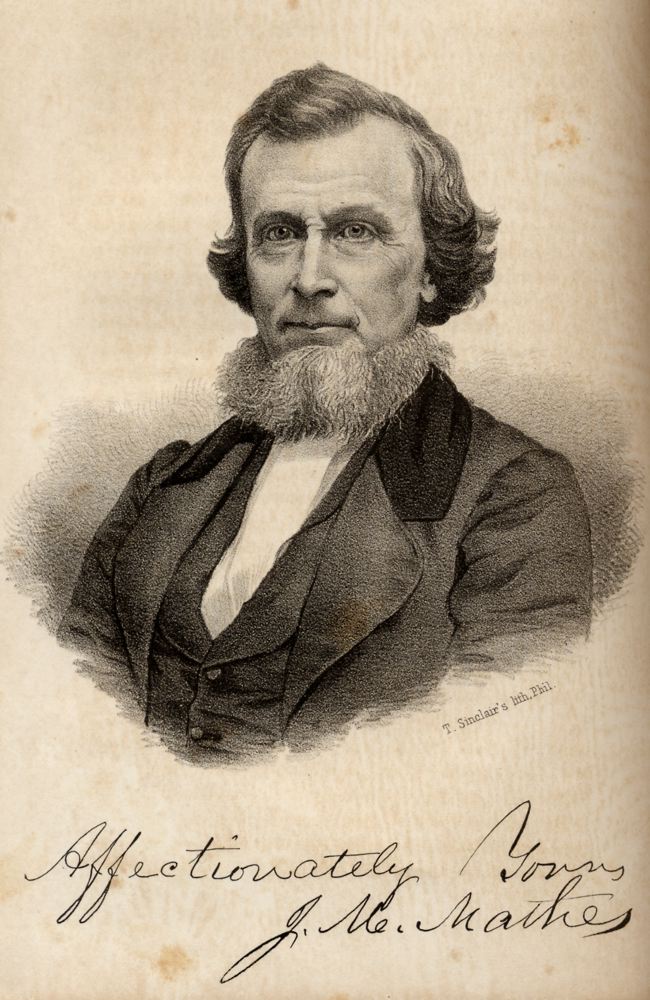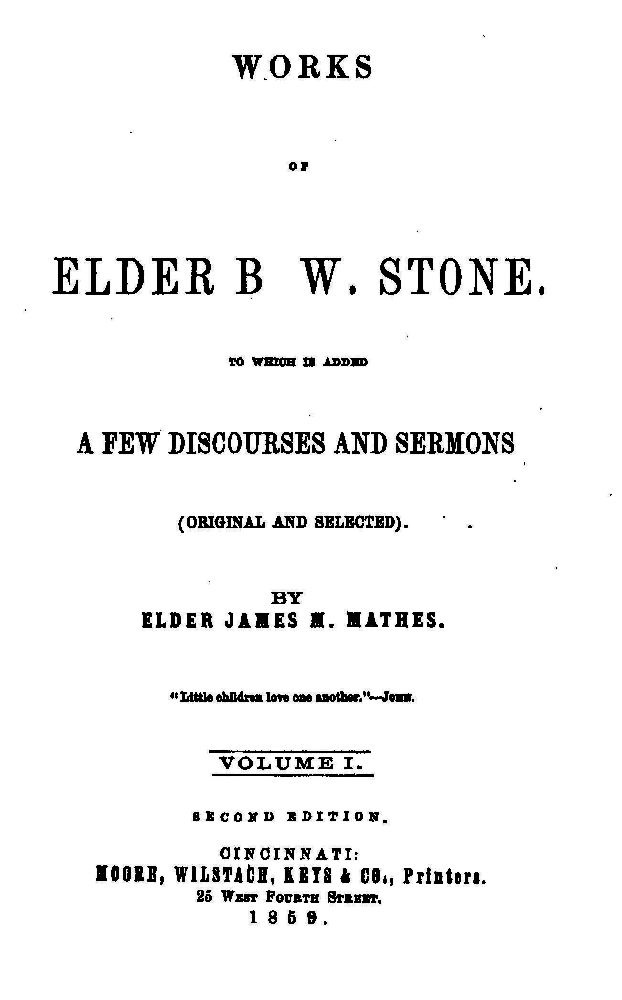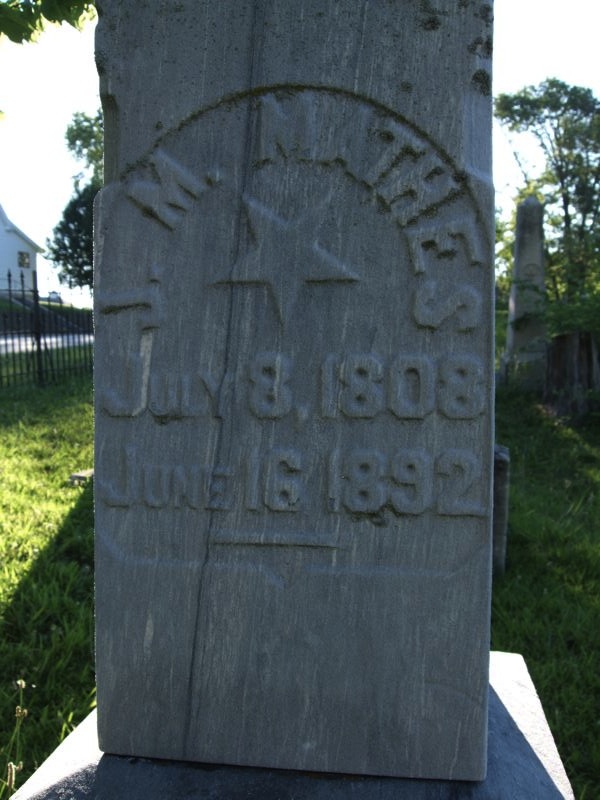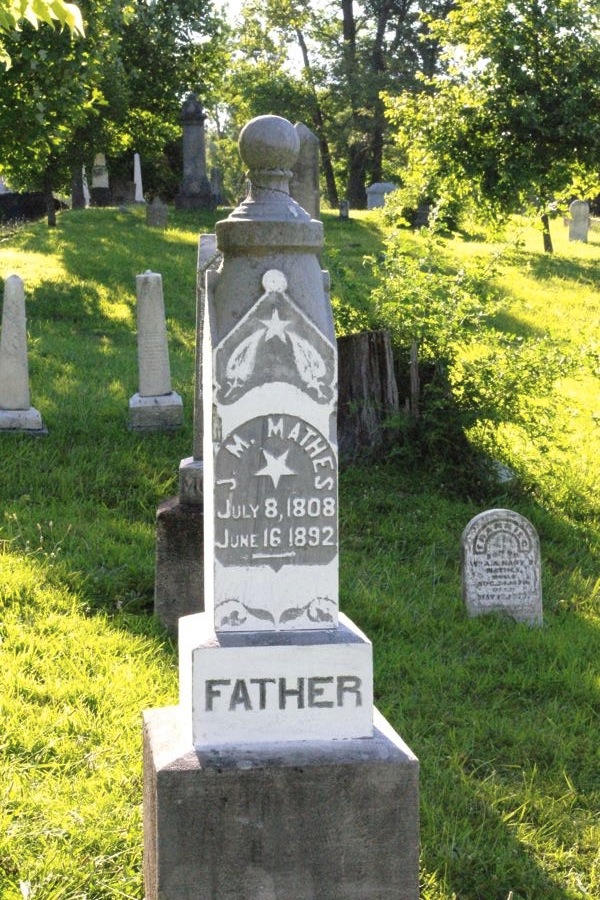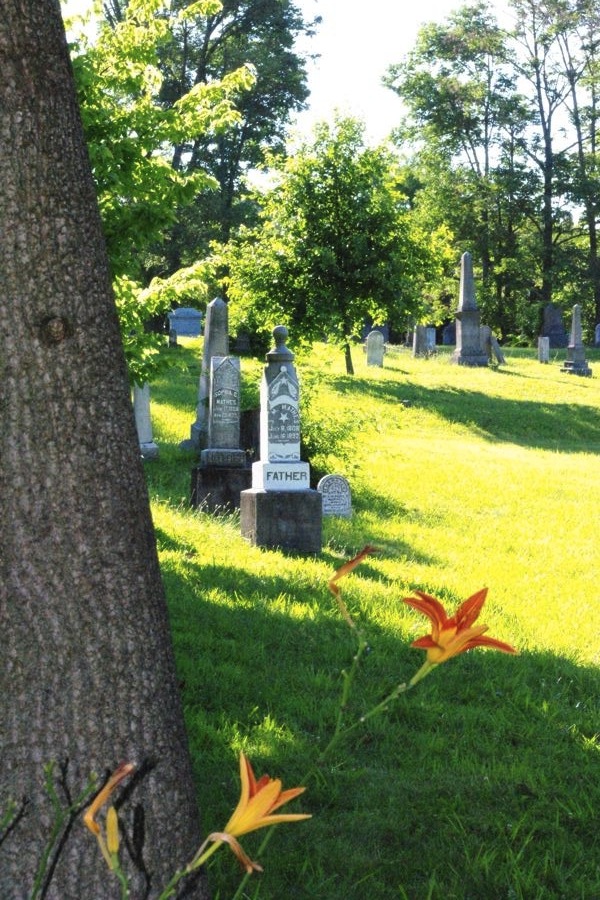James Madison Mathes
1808-1892
![]()
The Life Of J.M. Mathes
Of all the preachers of Indiana, whether of the past or the present day, none has contributed more to the progress of the current Reformation than the subject of this sketch. He was born on the 8th of July, 1808, in Jefferson county, Kentucky, near the site of the present village of Brownsborough. His progenitors, a few generations past, were inhabitants of the county of Antrim, in the north of Ireland. His grandfather served under General Washington in the war of Independence, as quartermaster of a Virginia regiment. His father, Jeremiah Mathes, was born in Shenandoah county, Virginia, whence, about the close of the last century, he emigrated to Kentucky.
In the year 1804, Jeremiah Mathes was married to Florence Cameron, a descendant of the celebrated Parson Cameron, who is embalmed in Scottish history by the side of the Wallaces and Bruces. Her father, John C. Cameron, an educated Scotchman, also served a long time in the Revolutionary war, and was wounded in the battle of Brandywine.
Elder Mathes is therefore a descendant of two patriotic families, whose spirit he inherits, and whose good name he has never sullied. Though too old to enter, himself, into the great struggle now going on between patriots and rebels, be has sadly but willingly laid his three sons on the altar of his country.
His grandfather, John C. Cameron, after retiring from the service of his adopted land, spent the remainder of his days as a professional teacher—disseminating intelligence,
"A weapon surer yet
And mightier than the bayonet;
A weapon that comes down as still
As snow-flakes fall upon the sod,
And executes the freeman's will,
As lightnings do the will of God."
Religiously he was a Covenanter, as were all the Cameron family in the old country.
On the other side, the Matheses had been Presbyterians almost from the beginning of Protestantism; but early in the present century the father of Jeremiah Mathes, and his whole family, were converted to the views of the Regular Baptists, with whom they all became identified.
About the year 1825, the parents of Elder Mathes became convinced of the errors of the Calvinistic system, and of the folly of all human creeds. In consequence of this conviction they left the Baptist Church and united with the Old Christian body, in Owen county, Indiana, whither they had removed some years before.
James M. was the second of a family of eleven children, six sons and five daughters. Two of his brothers, John C. and J. J. W., are also able ministers of the gospel. The other three, Henry, William, and Franklin, are industrious and well-to-do farmers. All the brothers, together with the five sisters, are still living, and all are faithful members of the Christian Church.
Elder Mathes was strictly brought up in that particular form of Calvinism held by the Regular Baptist Church. His public teachers in these things were John Taylor, Win. Keller, George Waller, Zacheus Carpenter, and other early preachers of Kentucky, whose names are yet familiar to many aged disciples. In their doctrine were many things hard to be understood, yet he endeavored to believe "every word," because it was believed by his parents, in whose judgment he reposed implicit confidence.
His mother taught him to read when he was very young; and the first act that he can remember is his reading the Holy Scriptures. Thus early was he taught to love the Bible and reverence it as " indeed and in truth the word of the living God." Through this wholesome teaching it is probable that the outline of his character and the course of his future life were marked out before he was eight years old!
Certain it is that at a very early period of his life he manifested a remarkable fondness for public speaking, in which he was promptly aided and encouraged by his parents and grandparents. His grandfather, especially, who was a well-informed man, took great delight in teaching him to make little speeches and take part in simple dialogues. As often as a few of the neighbors would come in, the old gentleman would place the young orator upon a table, where he would pronounce his little orations to an audience far better entertained than many have been by more prosy and more pretending addresses.
At church he watched with a mimic's eye all the movements of the speaker, and, on returning home, he practiced the same attitudes in the delivery of the short and simple speeches which his hopeful grandfather had taught him. Even at that age he had resolved to be a preacher of the gospel; and often would he discourse with great earnestness to his playmates, all seated around according to his directions, and all listening demurely to his admonitions. At a later period he used to write his discourses, one of which is believed to be extant, but in a portion of the country not now accessible. It was written on the following passage in Jeremiah: "O that you had hearkened to my commandments; then had your peace been as a river and your righteousness as the waves of the sea."
Soon after his father's immigration to Indiana, a missionary by the name of Isaac Reed came from Western New York, and settled in the same neighborhood at a noted Big Spring near Gosport. Being Presbyterians, and having a "zeal for God, but not according to knowledge," they opened a Sunday-school in their own cabin. The establishment of this school was hailed with delight by the juvenile preacher. He attended regularly, applied himself closely, and soon became distinguished for his proficiency in memorizing the Scriptures. "The Shorter Catechism" he also mastered so completely, that he could answer almost every question it contained. Along with these answers, he received into his mind much error; but the inspired texts committed, proved to be as " a little leaven that leaveneth the whole lump." Even the knowledge of the doctrines and commandments of men, thus acquired, has been no disadvantage to him in the conflict of life.
This was the first school of any kind he ever attended. When, in 1816, his father removed with him to Indiana, Owen county was a wilderness from which the savages had not retired before the advancing tide of civilization. It afforded then, and during nine years subsequent to that time, no facilities whatever for education. It was not till the year 1825, that Scott W. Young (who subsequently married the eldest sister of Elder Mathes) came from Kentucky, and taught several schools in Owen county. These schools Elder Mathes attended regularly, and by close application he acquired the rudiments of a common education, including a smattering of English grammar.
From a child he was inclined to wisdom's ways. The simple prayers taught him by his pious parents were seldom neglected until he attained to sufficient age to embody, in words of his own, the grateful emotions of his heart. He often prayed to his Heavenly Father in secret, and inquired of his relatives and friends what he must do to be saved. But they were blind leaders of the blind, anxious, but incompetent, to show him the path of life. He longed to see some great "light from heaven," to "hear the voice of an angel," or, at least, to dream some good, orthodox dream, which would be satisfactory evidence of his acceptance with God. But he could neither see, hear, feel, nor dream any thing that gave him full assurance of his conversion.
He continued in this uncertain state of mind for five long years. He attended the meetings of all denominations, but none of the preaching afforded him any relief, for none was according to the oracles of God—none took away the veil of Calvinism, which was closely drawn over his heart. According to the direction of the Calvinist he endeavored to resign himself to perdition. Following the advice of the preacher of "free grace," he repaired to the anxious seat. All the popular expedients were resorted to in vain. Year after year did the wintry gloom disappear from the face of Nature; but from his brow the dark clouds were not driven. Spring after Spring the vernal sun called forth leaf and blossom; but no mysterious power caused to appear, in his heart, "the tender leaves of hope." On every side of him others glorified God; but he, though equally sincere, had no new song put into his mouth.
 Unable to reconcile this fact with the Scripture which affirms that God is no respecter of persons, he presented his difficulty to the ministers, who attributed his ill fortune to his want of faith. It may seem strange that under their instruction he had been praying for years without faith. But the fact is they proceeded on the correct assumption that the penitent had faith when he presented himself at the altar of prayer; and when one professed to have obtained pardon they received his testimony as an additional proof that justification is by faith only. But when, as in the case of Elder Mathes, there was a failure in the struggle for remission of sins, they dared not Acknowledge the faith of the penitent, for by so doing they would have disproved at once the " moat wholesome doctrine and very full of comfort." The extremity to which the system was reduced by these failures, gave rise to at least two grievous but popular errors.
Unable to reconcile this fact with the Scripture which affirms that God is no respecter of persons, he presented his difficulty to the ministers, who attributed his ill fortune to his want of faith. It may seem strange that under their instruction he had been praying for years without faith. But the fact is they proceeded on the correct assumption that the penitent had faith when he presented himself at the altar of prayer; and when one professed to have obtained pardon they received his testimony as an additional proof that justification is by faith only. But when, as in the case of Elder Mathes, there was a failure in the struggle for remission of sins, they dared not Acknowledge the faith of the penitent, for by so doing they would have disproved at once the " moat wholesome doctrine and very full of comfort." The extremity to which the system was reduced by these failures, gave rise to at least two grievous but popular errors.
1. The denial of the faith of the unsuccessful penitent, necessarily originated the doctrine of repentance before faith.
2. The attributing of the failure to lack of faith on the part of the penitent, necessarily originated the idea of divers kinds of faith. For since the Scriptures say, " Let him that asketh ask in faith," the preachers were bound to admit that faith is antecedent to prayer. Now, the praying penitent having faith, and the doctrine of "justification by faith only" being true, pardon was to be expected, in every instance, as a logical, an inevitable sequence. When it did not follow—when the subject did not profess to have " got religion," some objection had to be made to one or the other of the premises. The major premise, that " we are justified by faith only" could not be objected to because it was in the creed. The minor premise had been admitted—namely, that the penitent had faith before he prayed; therefore there remained, but one way of escape, and that was by affirming that the faith of the penitent was not of the right land. Hence the origin of such phrases as "faith of assent," "saving faith," etc., etc. The system sought out this invention for the sake of self-preservation—on this ground only is it pardonable.
Sadly perplexed by these absurd teachings, Elder Mathes sought in skepticism the relief he could not find in religion. He doubted, for the first time, the authenticity of the Scriptures; withdrew for nearly a year from the sanctuary, sought to forget God in the company of the gay and thoughtless; devoted his leisure hours to the reading of infidel books; and stopped not in his hopeless career until he reached the very border of atheism.
But in every giddy round of pleasure he saw continually before him the meek and troubled expression of his pious and affectionate mother, who, more watchful than he had anticipated, perceived with pain his every aberration from the path of virtue. Her influence, and that alone, kept him from plunging openly into "many foolish and hurtful lusts that would have drowned him in destruction and perdition."
Finally he resolved to dismiss from his mind, as far as possible, all previous religious teaching; and to read again the New Testament as if he had never read it before. In so doing his doubts were all dispelled, and he again believed with all his heart that "Jesus is the Christ, the Son of God."
The entrance of God's word also gave him light as to the means by which he might obtain pardon. In looking into "the perfect law of liberty," he saw, with some degree of clearness, the plan of salvation; and was made exceedingly happy in believing the truth.
With joyful haste he communicated his convictions to his religious friends, some of whom, to his surprise, expressed serious doubts relative to the safety of his more excellent way, while some confidently pronounced his strange doctrine a delusion of the devil.
Among others he went to see an old brother by the name of John Snoddy, a very candid and pious man, and one of the few that, with B.W. Stone, seceded from the Presbyterian Church in Kentucky. After his youthful visitor had stated his view of the gospel plan of saving sinners, the' old brother replied with tearful eyes as follows: "Brother James," said he, "it is contrary to my experience, but what am I that I should withstand God? You are right. It is the Lord's word, and there/ore safe. Go on, and the Lord bless you, my son." Italics can not do justice to these "words fitly spoken." They deserve to be inscribed in letters of gold on every sectarian pulpit in the land. They gave great encouragement to the young reformer, who resolved to obey the gospel the very first opportunity.
That opportunity did not present itself for a long time; for in all that section of country there was not a preacher that would immerse him "for the remission of sins!"
At that time he had heard of Alexander Campbell, but he knew nothing whatever of his views. He had always heard him spoken of as an arch-heretic; and he had not the remotest idea that Campbell was in advance of him in the very way which he (Mathes) had recently discovered. Elder Mathes is, therefore, another who derived his "Campbellism" directly from the Bible. In the absence of other testimony, the fact that so many in that dark era came, each without the knowledge of another, to the same conclusions, from the study of the Scriptures, would be at least strong presumptive evidence that the doctrine they then embraced, and have since maintained, is taught in the book of God.
About the 1st of September, 1827, Mr. Mathes obtained a copy of Campbell's "New Version" and a few numbers of the "Christian Baptist." The former greatly assisted him in arriving at the true meaning of the Scriptures, while his faith was confirmed by the able articles contained in the latter.
In October following he attended a great camp-meeting held by the Newlights at Old Union meeting-house, in Owen county. On Sunday morning he walked out with Elder John Henderson, one of the principal preachers, sat down with him on a log, and actually taught him "the way of God more perfectly." At first the good man listened with suspicion; but as the argument progressed he became deeply interested, and, finally, was so overwhelmed with evidence that he exclaimed: " You are right, my son; it is the Lord's plan; and whatever he commands I can cheerfully perform, I am ready to immerse you for the remission of sins." They then returned to the place of meeting, and, at the close of a discourse by Elder Blythe McCorkle, Father Henderson, with a word of apology and explanation, invited sinners to come forward, confess the Saviour as he was confessed in primitive times, and be baptized every one of them for the remission of sins. J. M. Mathes and his sister Eliza made the good confession, were immersed straightway by Elder
Henderson, and, for the time being, united with the Old Christian or Newlight Church.
Immediately after his immersion he began to take an active part in the public prayer-meetings, exhorting his brethren as often as he was called upon. He also engaged earnestly in teaching from house to house, and by the wayside, the things pertaining to the kingdom of God.
He may be said to have entered upon his ministry when he sat down on the log with Elder Henderson—in fact when he first discovered the divine plan of pardon; for the gray-haired minister that immersed him was really his third convert, his sister being the second, and old Brother Snoddy the first.
On the 5th of March, 1829, he was married to Sophia Glover, a pious young sister in the household of faith. She was born in Virginia, whence her father removed, first to Montgomery county, Kentucky, and subsequently to Owen county, Indiana. Through their long pilgrimage together she has been an exemplary Christian, an amiable and faithful companion. Meek and uncomplaining, she has submitted with cheerfulness to the lot of a minister's wife, and has always encouraged her husband to labor for the salvation of sinners and the extension of the Redeemer's kingdom.
Their union has been blessed with three sons and three daughters, all of whom are still living, and all are members of the Church of Christ except the youngest son.
In June, 1831, he re-organized the church at Old Union, all the members entering heartily into the Reformation except one sister, who joined the Protestant Methodists and became a public teacher of their doctrine. In the absence of more experienced leaders, he was compelled to take a prominent part in the conduct of the new organization, the work of edifying the body devolving almost entirely upon him.
In the Fall of the same year (1831) the first co-operation meeting held in the State took place at Crawfordsville. To that meeting he and Elder T. C. Johnson were appointed messengers. Arriving upon the ground, they found the following preachers in attendance, viz.: Michael Combs, Andrew Prather, Jas. R Ross, Sears, John M. Harris, and Wm. Wilson—only six, a number which clearly indicates that the Reformation in Indiana was then in its infancy. At that meeting, and in the house of old brother James McCullough, Elder Mathes made his first attempt at preaching, beyond the bounds of his own congregation.
Returning home, the messengers aforesaid entered with fresh vigor into the evangelical field; yet their sphere of usefulness was necessarily limited. Elder Johnson was clerk of the county; and Elder Mathes was obliged to teach school for a livelihood. Consequently to preach on Sundays, and occasionally to hold a two-days meeting, was the best they could do.
The plan of sustaining an evangelist by contributions from the people—for there were no churches—had been but slightly discussed, and had met with but little favor In that quarter of the world, also, the doctrine obtained that a minister of the gospel ought to preach for nothing and board himself. It was generally supposed to be right to feed a preacher's horse, if he was so fortunate as to have one; and also to feed the preacher himself, if he would go from house to house for his meals. There was no law against giving him a pair of socks, especially if, as he sat around the old-fashioned fireplace, his protruding toes invoked a covering; and if he. had a river to cross in order to reach his next appointment, it was conceded to be lawful for some rich man to slip into his hand the amount of the ferriage. This last act, however, was perpetrated very stealthily, that the left hand might not know what the right hand did!
Under these circumstances, he did not receive from the churches, during the first ten years of his ministry, an average of one hundred dollars per annum. Even this small pittance was received, for the most part, in articles of food and raiment—country jeans, the broadcloth of those times, being a legal tender.
The perquisites of his office were also few and small. On a certain occasion, he rode some six or eight miles, in very cold weather, to join in happy wedlock a country lad and lass. The ceremony performed, the delighted groom took him to one side and inquired the amount of his claim. He replied that in such cases he usually made no charge; but left the amount to be determined by the liberality of the party benefited. "Well, then," said the new-made husband, "take this, any how," at the same time dropping into his hand three Spanish bit, or thirty-seven and a half cents.
From 1830 to 1838 he taught school the greater part of his time, but preached on Sundays in the neighborhood, and, occasionally, during his vacations, he held protracted meetings at various points. His labors were mostly confined to the counties of Clay, Owen, Monroe, Morgan, Putnam, and Lawrence. He was very successful in his ministry; many new churches were organized; and hundreds obeyed the gospel and took their stand on the Bible alone.
In the year 1833 ho was ordained to the ministry by fasting, prayer, and the imposition of hands.
In the Fall of the same year, while on a tour through Clay county, he met with a violent opposer by the name of Burberage, with whom he first measured swords in public. The conflict was short, but decisive; and hardly deserves to be called a debate.
The following Autumn, however, a regular discussion took place at Pleasant Garden, Putnam county, between him and the Rev. Lorenzo D. Smith, of the M. E. Church. This was a highly exciting contest, which resulted in great good to the cause of reform, and inflicted a blow upon Methodism from which it has not recovered to this day.
In those days he had many little skirmishes with the enemies of the truth; for he was assailed on every hand, and he never declined battle when it was offered.
By this time he had acquired, mainly by his own efforts, a tolerable English education; but his experience in debates led him to desire a wider scope of information, and a more thorough mental discipline—especially did he covet a knowledge of the Greek language. He therefore determined to make an effort to secure these desired objects. Many things stood opposed to the enterprise, not the least of which was poverty. But he rented out his little farm in Owen county, gathered together a small sum of money by selling off his stock, and, in Autumn of 1838, removed to Bloomington, and became a student of the State University.
To maintain his family and defray his expenses in college, he preached regularly for the churches at Bloomington, Clear Creek, Harmony, and Richland. These congregations prospered in his hands, and, despite this extra labor, he made rapid progress in his studies, especially in Greek.
There were with him in the Greek Testament class several young men of Pedobaptist training, and consequently of Pedobaptist views. When the class began, the President. Dr. Wylie, instructed them to translate the original text as if it had never been translated, giving to every word its primary meaning, according to their several lexicons. Under this rule they all went on harmoniously until they came to the word Baptizo. This Elder Mathes rendered "to immerse." The Pedoes protested, but he persisted. Unable to silence him by their own arguments, they appealed to Dr. Wylie, who, in hearing their grievances, decided that there was no just cause of complaint—that Mr. Mathes was only obeying orders, for such was without doubt the primary signification of the term. The decision was final; but the Pedobaptists, wiser than seven men that could render a reason, continued to use the word "baptize."
This was by no means the only concession that the learned Presbyterian Doctor made to his pupil, with whom he condescended to an intimate acquaintance. He frankly admitted the correctness of many tenets of the Reformation, and was, for a long while, almost persuaded to be a Christian.
He remained in the University until April, 1841, and was, at the time of leaving, a member of the senior class. Financial embarrassments prevented him from being graduated.
On leaving college he returned to his little farm in Owen county; and, having made arrangements for its cultivation, he gave himself wholly to the word. Being exceedingly zealous, he labored incessantly night and day; and, in all places, his efforts were crowned with remarkable success. Having learned also to wield the pen, he began to contribute to the Christian periodicals generally; and, by this means, he soon became widely known as an able and earnest advocate of primitive Christianity.
In the month of February, 1842, he met the Rev. James Scott, of the M. E. Church, in a public discussion. This took place at Martinsville, Morgan county, and continued three days. The result of the engagement may be inferred from the fact that, until this day, the Christians have occupied the field in force.
In the Fall of this year he attended the annual meeting at Old Mill Creek, Washington county. John Wright, Br., presided; Absalom Littell, and other preachers, assisted; but Elder Mathes was the chief speaker. The meeting continued only eight days, and closed with one hundred additions. Such glorious meetings were frequent in those days, when the disciples had not only knowledge, but zeal according to knowledge—when they did not shrink from pointing out the difference between Christianity and various isms, through fear of being called "uncharitable." During the year ending May, 1843, Elder Mathes immersed six hundred and seven persons. Even a greater number were enlisted under his preaching, but some were immersed by other hands. This was the most successful year of his ministry; but for thirty years past he has proselyted from two to three hundred per annum, making a total of five or six thousand.
In May, 1843, he engaged in another public debate, at Greencastle. His opponent was Rev. Erasmus Manford, the editor of a Universalist paper at Terre Haute, and the great apostle of Universalism in Indiana.
In July of this year he commenced the publication of "The Christian Record," a neat monthly of twenty-four pages. Except the Millennial Harbinger, it is the oldest living advocate of the current Reformation. It was first issued at Bloomington, and it gradually increased in popularity until it reached its maximum circulation of five thousand.
Over these subscribers, their families and friends, he, for years, exerted a controlling influence. Through the columns of his paper he inspired their hearts with zeal and courage; opened the Scriptures to their understanding; showed them how good and pleasant it is for brethren to dwell together in unity; demonstrated the evils—the sin—of sectarianism; and warned them against every delusion, of whatever name or description. Millerism and Universalism, especially, he combated with signal ability, until they were no longer able to offer a respectable resistance.
The cause of education also received special encouragement from his columns. He did much to extend the fame and influence of the State University; and his pen was one of the ablest advocates of the establishment of the N.W.C. University, which is now the pride of the brotherhood. He was one of the original commissioners named in the charter of that institution; and was a member of the Board of Directors from its organization until 1856.
At the beginning of Volume V. the number of pages of the Record was increased to thirty-six, and the amount of reading matter nearly doubled. At the same time the publisher associated Elder Elijah Goodwin with him in the editorial management of the paper. This partnership continued to the middle of Volume VI., first series, when Mr. Goodwin retired from the firm.
In the Fall of 1843 he sold his farm and removed to Bloomington that he might the better superintend his publishing business.
About the year 1848 he purchased the office, press and stock of the "Bloomington Herald," and commenced the additional publication of "The Indiana Tribune," a weekly family newspaper, neutral in politics.
In the Spring of 1851 he discontinued the Tribune, and removed to Indianapolis, where he continued the publication of the Record. There he also engaged in the book and stationery business; and finally became a stockholder in the Indiana Journal Company.
During his residence in Indianapolis he performed an immense amount of labor. In addition to his editorial employments, he preached a great deal in various parts of the State; was for a while pastor of the congregation in the city; attended to the business of his book concern; and rendered efficient service as a member of the Executive and Building Committees of the N. W. C. University. Under such constant pressure his health gave way; and he found it necessary to undo the heavy burden by changing his locality.
Accordingly, on the 5th of November 1855, he left Indianapolis and removed to a farm which he had purchased, near Bedford, in Lawrence county. He left the city with a sad heart; for he had been unfortunate in his business transactions, and was poorer by several hundred dollars than when he entered into it. He is another of the few who, realizing the truth of the Saviour's aphorism, have chosen to fail in the service of Mammon rather than in the service of God.
For a few years after his removal to Lawrence he continued to publish the Record at Indianapolis; but he finally established a printing office at Bedford, which then became the place of publication. In a few months he again removed the Record to Indianapolis, where he continued to have it issued until June, 1859, when, owing to the inconvenience of editing at so great a distance, he transferred it into the hands of Elder Elijah Goodwin, by whom it is at present controlled.
This excellent periodical Elder Mathes ably conducted through sixteen and a half volumes, which will be invaluable to the future historian, who shall record the Rise and Progress of the Reformation in Indiana.
Improved in health but not in fortune by his residence in Lawrence, he gave up his farm, for which he was unable to pay; removed with his family to New Albany; and became the pastor of the church in that city. This position he occupied from June, 1859, to May, 1861.
While at New Albany he prepared and published a book of four hundred and eight pages, entitled, "Works of B. W. Stone." It is chiefly compiled from the writings of that lamented servant of God, and is a valuable addition to our Christian literature.
He also published, in 1861, a little volume of one hundred and eighty-nine pages, titled, "Letters to Bishop Morris." It contains fifteen letters addressed to Thomas A. Morris, D. D., Senior Bishop of the M. E. Church. The first eleven letters are a review of a small work by the bishop, entitled, "The Polity of the M. E. Church." In the other four the author gives his reasons for not being a Methodist. It is written in popular style; and those who may read it, will be both interested and instructed.
In May, 1861, he removed from New Albany to assume the pastoral oversight of the congregation at Bedford. The estimate placed upon his services at New Albany, may be inferred from the following resolutions, adopted on the eve of his departure:
"Whereas, Our beloved brother James M. Mathes has signified his intention to dissolve the relationship which has for some length of time existed between himself a3 pastor and ourselves as the Christian church in New Albany; therefore,
"Resolved, That it is with deep regret that we part with brother Mathes, who, by his Christian deportment, bright example, and able ministry, has won for himself our lasting respect and esteem.
“Resolved, That our good wishes, our kind remembrances, and our prayers, will accompany him wherever he may go; and that we can and do cheerfully and cordially commend him to all with whom he may hereafter associate, as a Christian and minister worthy of the love and esteem of the wise and good."
By the church at Bedford he is no less beloved; and his success there has been even greater than in New Albany. Under his able ministry has grown up a large congregation, which is just completing a house of worship second to but few Christian churches in the State. No man living exerts a stronger or more healthful influence over the citizens of Lawrence county.
Both of his married children reside at Bedford, the presence of whom and of a multitude of brethren and friends who fully appreciate him and his labors, greatly lightens the otherwise heavy burden of his long-accumulating cares.
For the last thirty years he has been industriously employed in the evangelical field; during which period his preaching alone has induced thousands to glorify the Father in the confession of the Son. Of these converts over four thousand have been immersed by his own hands. The heirs of salvation have also been greatly multiplied by many evangelists whom he has induced to enter the ministry, having first qualified themselves for its work.
If we add to all this the effect of his public discussions, and the influence of his writings—which will no doubt be re-published and read by thousands after his death—we shall then only approximate the blessed results of his self-sacrificing and well-spent life.
Elder Mathes is a medium-sized man, having weighed until recently about one hundred and forty-five pounds. He is now considerably heavier. He is five feet nine inches high, has a full round chest, and great muscular power. He stoops a very little, as he walks with a quick, stealthy step. As he moves along there is nothing ostentatious about him, his dress, or his gait. He has coarse black hair, and his blue eyes indicate a meek and quiet spirit, a sober, reflecting mind. He has a fine constitution, which is but slightly impaired by the infractions of time and toil. True, his hair is sprinkled with gray, and his beard begins to whiten with the frost of age; but his step is still firm, his vigor of mind and body unabated.
The following are the leading traits of his character.
1. He is a man of great ingenuousness. To his brethren and friends he opens his heart without reserve; and even in the presence of strangers there is about him no appearance of stiffness or distrust. He never attempts, by any ambiguity of speech or insincerity of action, to appear on both sides of a question, but he promptly chooses his position and frankly gives expression to his views. This element of character manifests itself, especially in his public discussions. In such engagements, however closely contested, he scorns all alliance with equivocation, sophistry, or deceitful handling of the word of God.
2. Very much of his usefulness as well as happiness, results from his eminent sociability. Wherever he goes he soon forms the acqaintance of almost every body; all his acquaintances are his friends; and being such they are the more easily persuaded to become the friends of Jesus by keeping his commandments. Aside from the knowlege of a graver kind, he has an inexhaustible supply of anecdotes, which but few can relate to better advantage or with more pleasure than himself. Though he has transmitted a rich legacy of wit to each of his children, yet he is still blessed above his fellows with that rare faculty which never fails to make its possessor a favorite in the social circle. His wit never descends to obscenity and foolish jesting:—
"Religion curbs indeed its wanton play, And brings the trifler under rigorous sway: But gives it usefulness unknown before. And, purifying, makes it shine the more."
3. Of such a nature as his, hospitality is a spontaneous growth. He uses it without grudging, though not without detriment to his earthly estate. His house has always been a kind of Disciples' Inn, open, and but too well patronized, on all occasions. He is ardently attached, not only to his family, but also to his brethren and friends; and in the entertainment of his visitors, he spares neither pains nor expense.
4. He is a true philomathean—one who loves the truth and searches for it as the covetous do for hid treasure. In the course of his life he has investigated a great variety of subjects, and, although not particularly noted for his scholarship, his mind is well stored with useful knowledge —especially the knowledge of God and of the great plan of redemption. His whole nature is deeply imbued with that wisdom which cometh down from above—which is " first pure, then peaceable, gentle, easy to be entreated, full of mercy and good fruits, without partiality, and without hypocrisy."
5. As a speaker he is always ready upon any subject within the wide range of his investigations. His mental forces are so well disciplined, that they can be brought into action at a moment's notice; and his retentive memory is well stored with the munitions of intellectual warfare. He is never eloquent; but he speaks with remarkable fluency, and apparently without effort. His voice is clear, mellow, and of more than ordinary compass; yet he does not startle his hearers with his emphasis, nor does he tickle their ears with a great variety of tones: it is the constant flow of well chosen words, each laden with its portion of some good idea, that at once pleases and instructs. There is nothing theatrical about his delivery. During the whole of his discourse he often stands in the very same spot, his feet close together; and his gestures are usually few and unimpressive. Yet, after all, his manner is earnest; his argument is conclusive; his exhortation is warm, seldom impassioned, often effectual. In the selection of his subjects he makes no effort to find "some new thing;" and his preaching is of that quality which "doeth good like a medicine," rather than of that highly-seasoned kind, which is pleasant to the taste, but productive of spiritual debility. He does not hesitate to declare the whole counsel of God, nor to expose any or all dogmas that may retard the progress of the truth; but his delivery is so mild, his representations so fair, and his expositions so clear and convincing, that he seldom gives offence. Especially, where he is known, can he, with impunity, utter sentiments which, if expressed by any one else, would be regarded as highly offensive.
His whole pulpit character is pretty well delineated in the following poetical description of
"A vet'ran warrior in the Christian field,
Who never saw the sword he could not wield;
Grave without dullness, learned without pride,
Exact, yet not precise—though meek, keen-eyed;
A man that would have foiled, at their own play,
A dozen would-be's of the modern day
Who, when occasion justified its use,
Had toil us bright as ready to produce;
Could fetch from records of an earlier age,
Or from philosophy's enlightened page,
His rich materials, and regale your ear
With strains it was a privilege to hear:
Yet, above all, his luxury supreme
And his chief glory was the Gospel Theme;
There he was copious as old Greece or Rome,
His happy eloquence seemed there at home—
Ambitious, not to shine or to excel,
But to treat justly what he loved so well."
6. As a writer he has long occupied a high rank, as the popularity of the Record, and of his other publications, clearly attests. 'With the pen, as in the pulpit, he imitates no one; but dashes on in a bold, free, independent style. He pays but little attention to rhetorical flourishes, but is prolific of ideas, which he conveys to his readers with great force and clearness, though not always in the fewest words. He is emphatically a ready writer, composing with as much ease as he speaks.
7. As a religious editor he was eminently successful, because of his rare qualifications. He possessed a thorough knowledge of the Scriptures and of the tenets of opposing sects, courage to stem the tide of opposition, prudence to avoid expressions that would have engendered unprofitable strife, a nice discernment in the selection of matter, a quick perception of what ought to be encouraged or opposed, and, above all, the ability to wield a swift, vigorous, and untiring pen. In every department of the Christian field he has been useful; but it is chiefly as a public journalist that he has made his indelible mark upon the age.
As already observed, he has not yet been overtaken by the infirmities of age, and his ancestors being remarkable for their long life, there is reason to hope that the day is far distant when his face shall be seen no more in the sanctuary of God. But should he fall tomorrow, his surviving friends may, without flattery or falsehood, inscribe upon his monument that most beautiful and desirable of all epitaphs:
"HE WAS A BURNING AND SHINING LIGHT."
-Madison Evans, Biographical Sketches of the Pioneer Preachers of Indiana, pages 277-299
![]()
J.M. Mathes Stained Glass Window
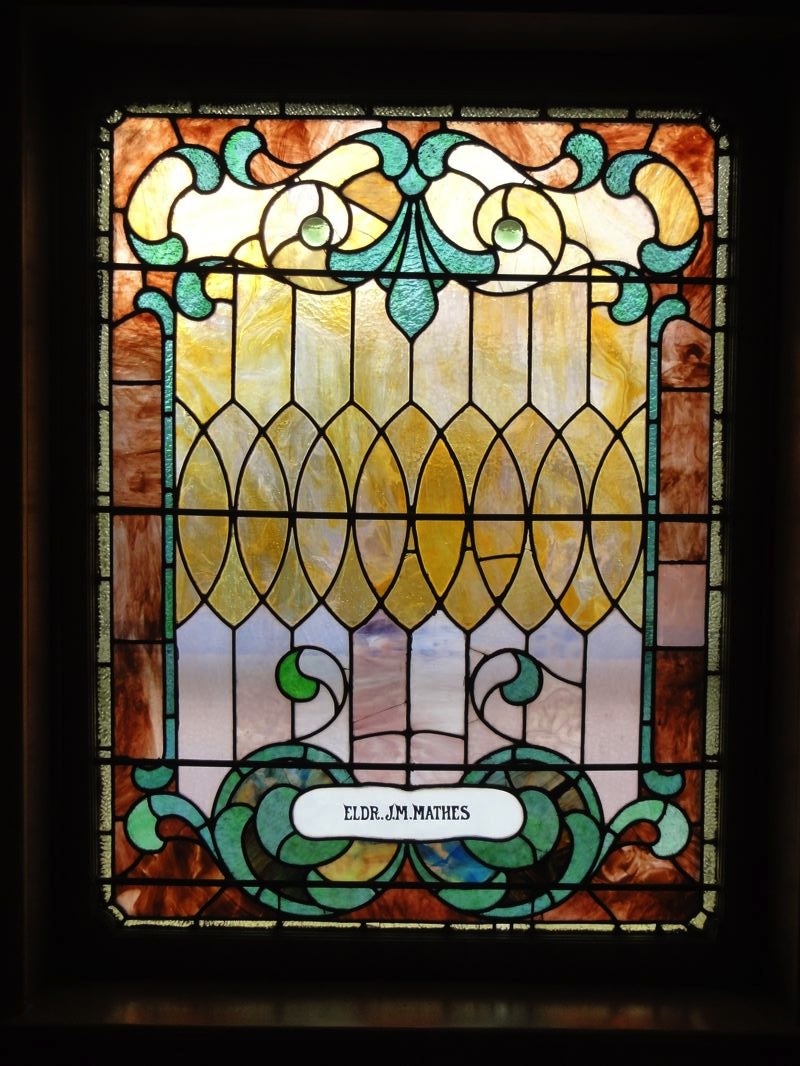
Eldr. J.M. Mathes
Window Hangs In Christian Church Building In Bedford, Indiana
Photo taken in May, 2012,
courtesy of Scott Harp
![]()
Frontispiece For Works Of Elder B.W. Stone, by J.M. Mathes
![]()
HOW A PALE-FACED LAD OUTRAN AN INDIAN CHIEF
The following unusual story is taken from the unpublished autobiography of James M. Mathes. Madison Evans, the biographer of Mathes, said: "Of all the pioneer preachers of Indiana, whether of the past or the present day, none has contributed more to the progress of the current Reformation than the subject of this sketch. He was born on the 8th of July, 1808, in Jefferson County, Ky., near the site of the present village of Brownsborough." ("Pioneer Preachers of Indiana.") When he was eight years of age, his parents moved to Indiana and settled in Owen County. The country at that time was a wilderness, from which the red man had not retired before the onward march of civilization. With much difficulty, young Mathes obtained a good education. Early in life he cast his lot with those who were seeking to restore the "ancient order of things." He was baptized by John Henderson in 1827, and began preaching in 1831. Indiana was his field. There he preached for more than fifty years. In 1843 he founded The Christian Record in Bloomington. He published this paper as a monthly until 1859, when he sold (or gave) it to Elijah Goodwin, who continued its publication until 1865. At that time it was bought by the company which was about to launch the Christian Standard. Later, in 1867, Mathes revived the name and edited a new Christian Record until 1884. Also, he edited a volume titled "Works of B. W. Stone" (1859); published his "Letters to Bishop Morris" (1861); and compiled a volume of sermons, "The Western Preacher" (1865). In 1870 he prepared and published "J. L. Martin's Lectures," or the "Voice of the Seven Thunders." He agreed to prepare the lectures, stereotype and publish the book for half interest in it; but before it came off the press he bought Martin's interest, for which he gave him a house and lot in Bedford, Ind. This proved to be a good investment. The book was very popular. Several editions were rapidly sold. Of the four books mentioned, this alone remains in print. Truly, "he was a burning and shining light." The story mentioned at the beginning of this article follows:
At this time, too, the Indians were very plentiful all over the country. The Delawares had sold their lands and were preparing to go West, into what was then Arkansas Territory, now, "Kansas," where the government had given them lands in exchange for their lands in Indiana. We saw them almost every day, and sometimes dozens at a time would come to our camp to get something to eat or to shoot at a mark. They were very friendly and harmless, and I believe, as a general thing, very honest. In the fall of 1821 the large body of the nation (Delaware), with their principal chief, whose name was "Silk Amos," on their way to Kansas, encamped at the mouth of Indian Creek about a half mile above where Gosport now stands. Here they remained to hunt and rest for some two weeks. Their camp was only about a mile from us, and we frequently visited each other.
One day while my father and I, with several other whites, were on a friendly visit to the Indian camp, the young chief, "Silk Amos," proposed by signs that we should wrestle. We were about the same size and age. I consented, and in the presence of the multitude I threw him down every contest, until I had thrown him some six or eight times, without getting a single fall myself. Then his father, the Old Chief, proposed to my father that we should run a foot race. To this my father consented, and so informed me, and requested me to run. This I did not like so well, as I felt pretty certain that he could outrun me. I had heard the other Indians speak of him as the champion racer of the nation. I had run with several of their fast men, and had outrun one of the best of them, but I rather dreaded this man. However, I consented to run with him, as I was accustomed to foot-racing and could outrun anyone that I knew of. The day for the race was set some time ahead that the Indians might get in from their hunting excursions.
The day came, and several thousand Indians were present, and all the whites of the neighborhood who could come were on hand to see the race. The race course was two parallel paths, one hundred twenty yards in length, running parallel with White River, and near the north banks from the mouth of Indian Creek, east and in sight of the bluff on which Gosport now stands. All things being in readiness, at the drop of the hat we started, he getting a little the start. All that vast, dusky crowd were silent all the grave till we had run over half the distance, when I passed him, and even lost sight of him from my side. And I turned my head to look for him, when he suddenly stopped and gave up the race. At this moment that sable crowd sent up the most unearthly shout that I ever heard, and which was heard at our camp and for miles around. I had outrun this celebrated young chief, and was, therefore, the lion for the time being. I was at once surrounded by the Indians, who with their hands made a close inspection of all my limbs and muscles; then, taking me upon their shoulders, they carried me in triumph around the camp.
The same afternoon I was chosen to be a chief of the Delaware nation, under the name of "Big --," and a committee were sent up to our camp to notify me of the fact and invite me down to the Indian camp to be adopted into the tribe. And, as an inducement, the committee made me the following proposition-viz.:
"If you will go with us and be our chief, we will make you much rich. You may select a tract of land, and make your own." We will give you heap money and heap squaws."
But this proposition I did not accept, of course. And two other committees were sent up to confer with me before they gave it up. I inquired of them what the ceremony of adoption was among them, and was informed that it consisted of the following acts: (1) The person to be adopted must declare his intention of renouncing the palefaces and of becoming an Indian. (2) He is then taken down into the river, or some other place where there is much water, and immersed. In this he puts off the paleface and puts on the Indian character. He goes down into the water a paleface, but comes up an Indian. This ceremony, with its significance, has no doubt been borrowed from Christianity through the teaching of some of the early missionaries or some other way.
-B.C. Goodpasture, The Pioneer Pulpit, Gospel Advocate, March 1, 1934, page 205
![]()
Directions To The Grave Of J.M. Mathes
The Mathes family burial ground is locate in the Green Hill Cemetery in Bedford, Indiana. The cemetery is located on 1202 18th Steet, Bedford. From the entrance follow the fence row across from the office (toward the east) about 150' to get to the Mathes plot. According to office records, the plot is in the "old part of cemetery - No Assigned Location." But it is very easy to find if you follow the directions above. While in the cemetery, another grave of interest is that of Dr. Benjamin Newland, (Find-A-Grave) murderer of the gospel preacher, Madison Evans.
GPS Location
38°51'30.8"N 86°29'11.9"W
or D.d. 38.858541,-86.486628
![]()
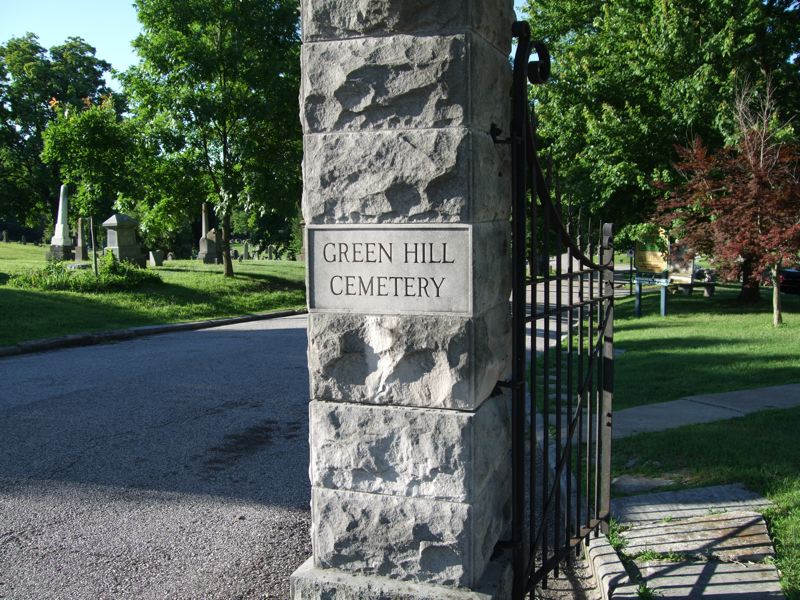
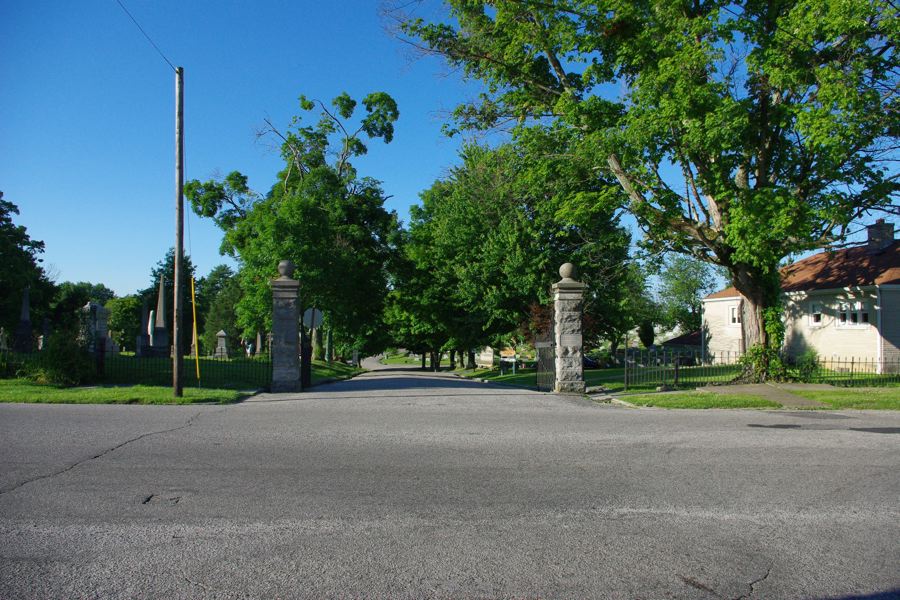
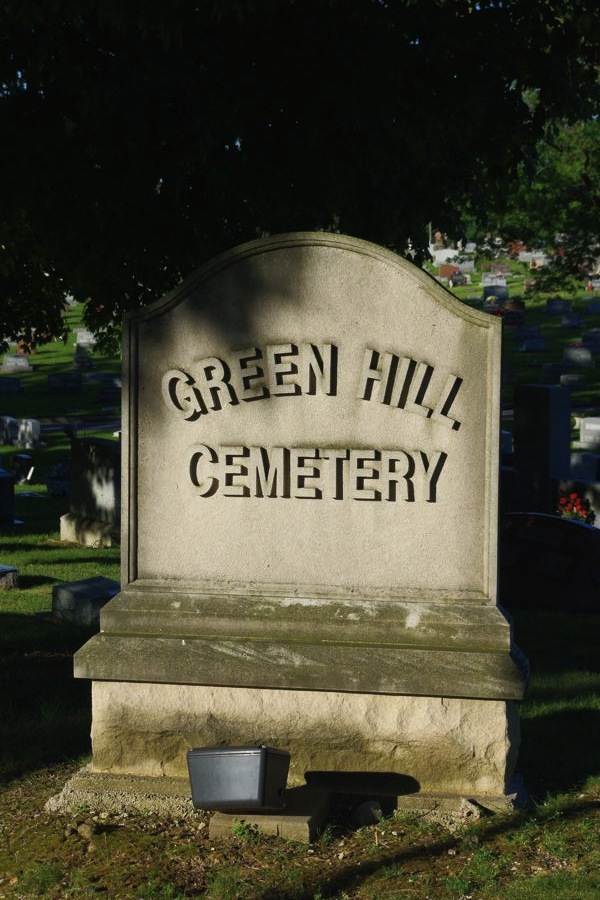
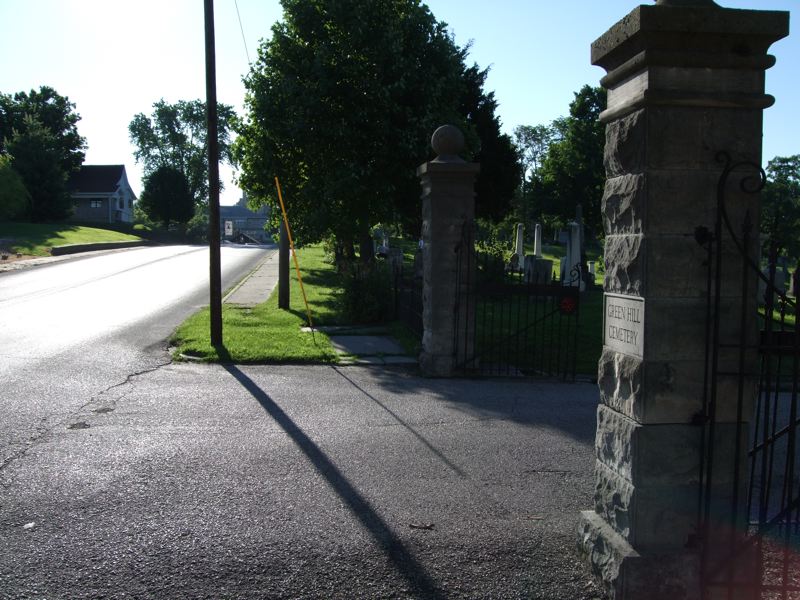
Looking Down Inner-Edge Of Cemetery For The Mathes Family Plot In The Distance
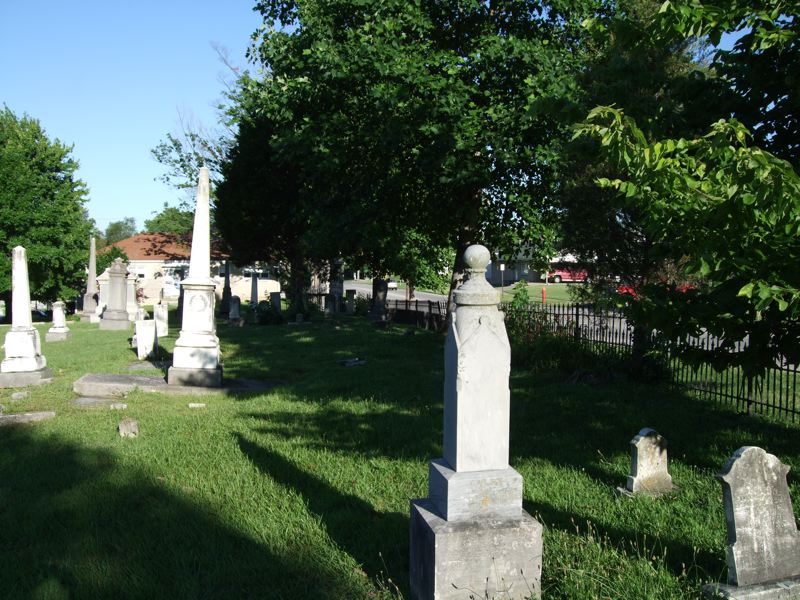
Looking From Mathes Plot Back Toward Entrance
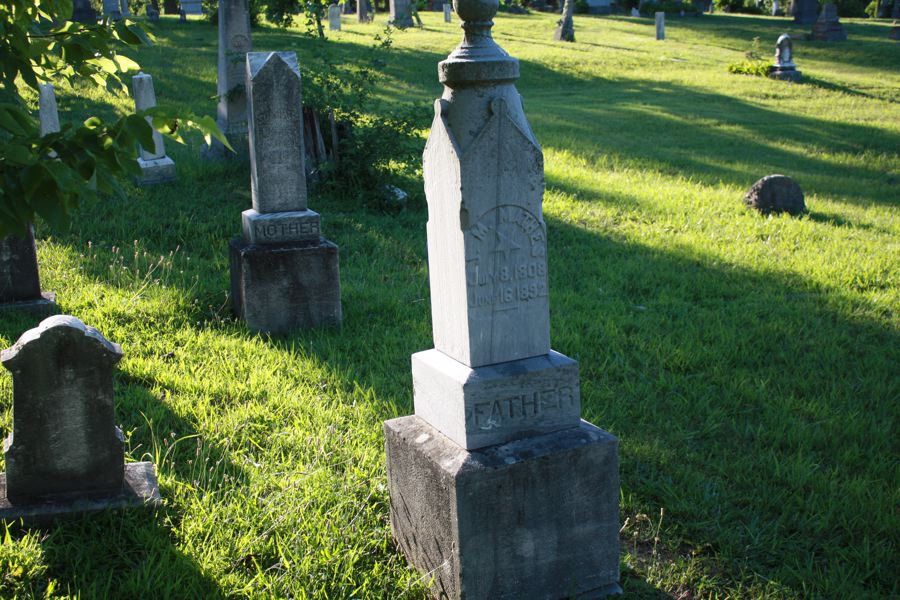
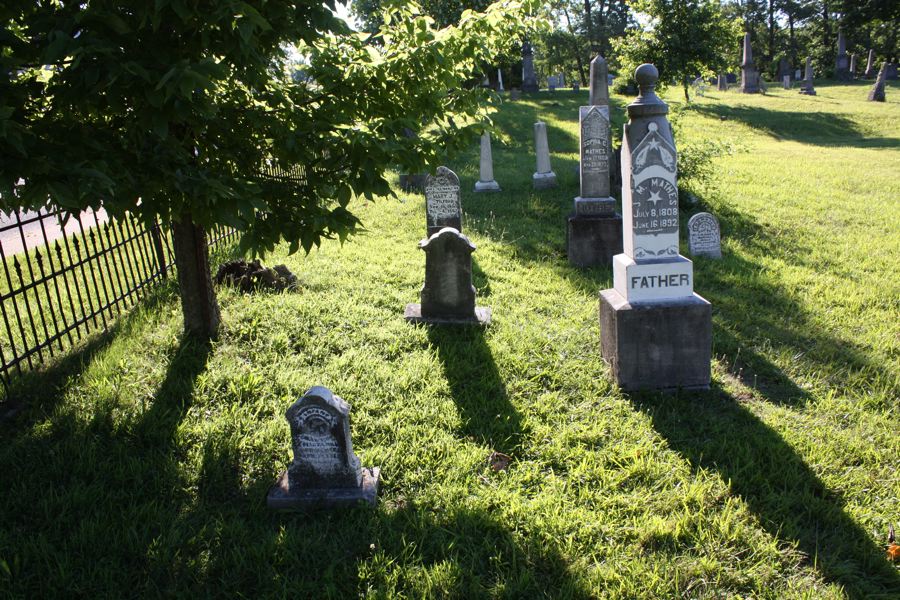
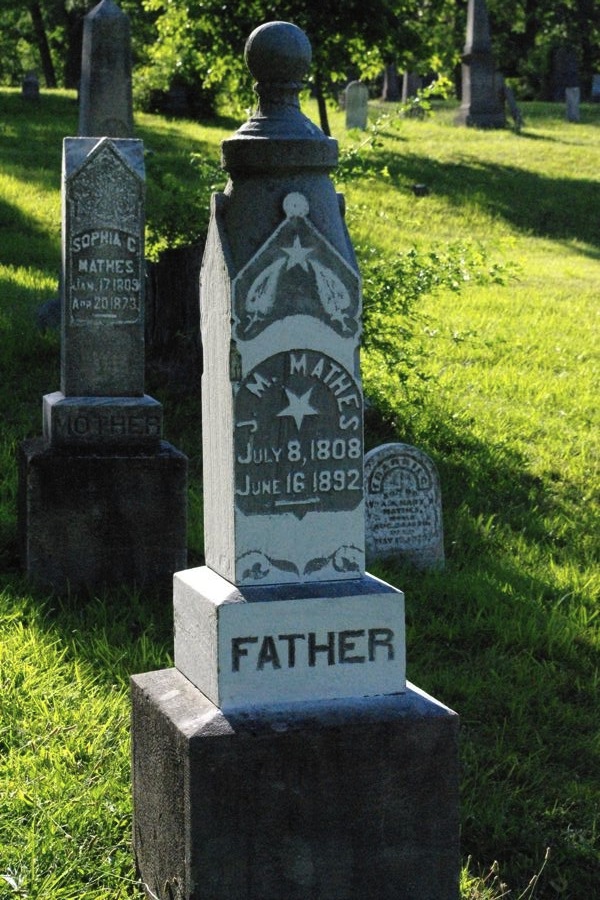
J.M. Mathes
July 8, 1808
June 16, 1892
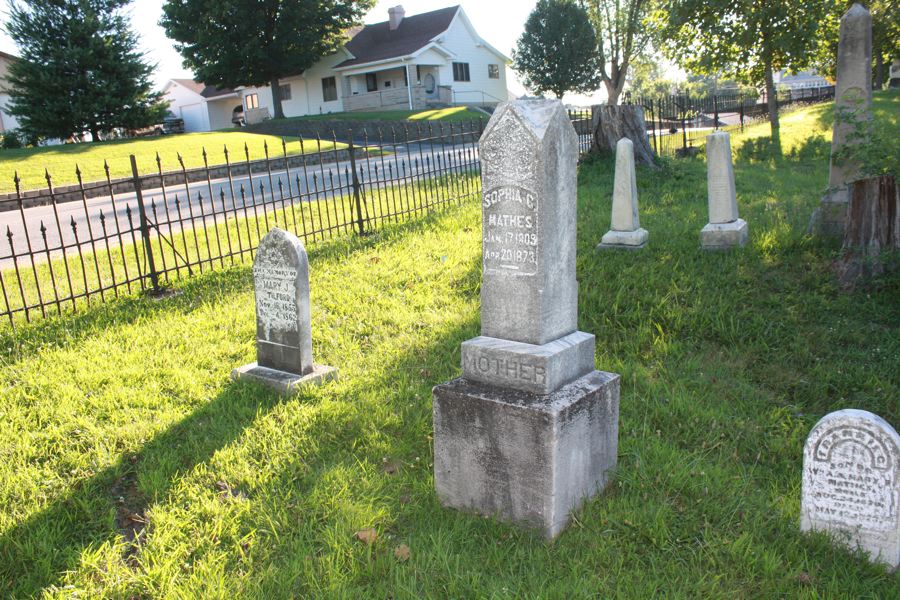
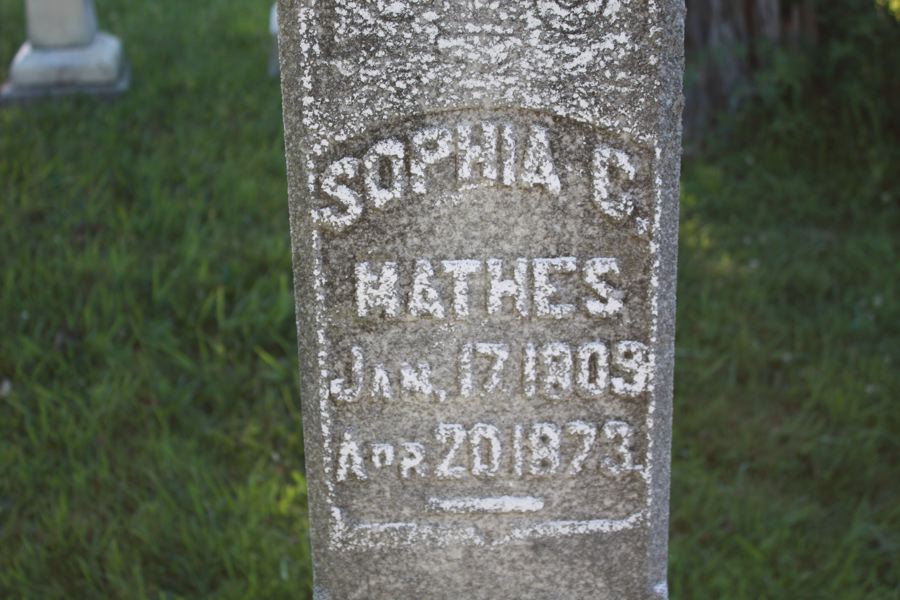
Sophia C.
Mathes
Jan. 17, 1809
Apr. 20, 1873
![]()
